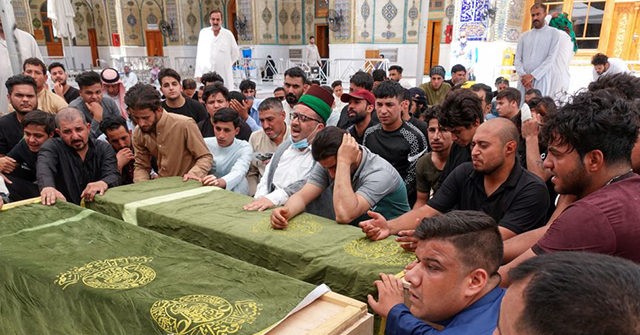By JOHN HAYWARD
Iraqi Health Minister Hassan al-Tamimi resigned Tuesday, saying he had a “moral obligation” to do so — and a need to preserve “my career path, my family, and professional history” — after a fire at the Ibn al-Khatib Hospital in Baghdad on April 24 killed about 130 people.
The Iraqi government officially believes 82 people died in the hospital fire, but the Iraqi High Commission for Human Rights put the death toll at 130 or more. Another 110 people were injured, according to the Interior Ministry.
The fire appears to have started after some oxygen tanks exploded. Most of the dead and injured were coronavirus patients. Ibn al-Khatib hospital, located in one of the poorest districts in Baghdad, did not have smoke detectors, sprinkler systems, or even fire hoses. The head of the Iraqi civil defense forces ruefully observed that the ceilings in the intensive care ward were made of flammable materials — one of many problems his forces pointed out to hospital administrators in safety recommendations that were tragically ignored.
“Doctors have warned of systemic mismanagement of the health care system, describing Iraqi hospitals as ticking time bombs because of lax safety rules, especially regarding oxygen cylinders. They say hospitals often lack smoke detectors and that visitors routinely smoke cigarettes around oxygen cylinders or bring in electric stoves to cook for patients,” the Washington Post observed.
An investigative committee reported to the Iraqi cabinet on Tuesday that the director of the hospital and other administrators should face disciplinary action, but not Health Minister al-Tamimi, who was suspended after the fire. Renewed protests in Iraq’s restless cities included calls for his dismissal.
The committee recommended lifting al-Tamimi’s suspension, but he resigned soon after its report was submitted, indicating his disillusionment with the “development of the health situation” in Iraq and the lack of support for healthcare workers.
Tamimi said he was unable to fix a “collapsed health system” because there was “no budget in 2020.” He warned that more disasters could occur in Iraqi hospitals.
Iraq announced a ten-day coronavirus lockdown on Tuesday as coronavirus infections rose around the country.
The government is urging citizens to get vaccinated as quickly as possible to alleviate stress on the dilapidated health care system, but the Associated Press on Wednesday described the rollout as “faltering” due to “apathy, fear, and rumors.”
Many Iraqis simply do not believe their government when it stresses the safety and importance of vaccines, and many of them prefer to avoid hospitals altogether, especially after the Baghdad fire. The public only grew more angry and disillusioned when coercive measures were deployed to make them accept vaccinations, including restrictions on travel and even loss of employment.
“It took a populist Shiite cleric’s public endorsement of vaccinations — and images of him getting the shot last week — to turn things around,” the AP noted. “Hundreds of followers of Muqtada al-Sadr are now heading to clinics to follow his example, underscoring the power of sectarian loyalties in Iraq and deep mistrust of the state.”





